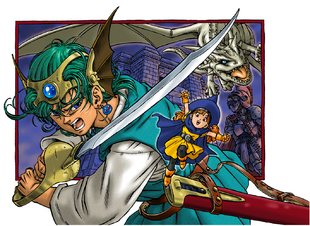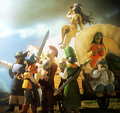Dragon Quest IV
| Main series games | |
|---|---|
| File:Dq4boxart.jpg Original artwork of the Famicom release | |
| Developer(s) | Chunsoft Heartbeat, ArtePiazza (PS) ArtePiazza, Cattle Call(NDS) |
| Publisher(s) | Enix Square Enix (NDS) |
| Designer(s) | Yūji Horii |
| Artist(s) | Akira Toriyama |
| Composer(s) | Koichi Sugiyama |
| Series | Dragon Quest |
| Platform(s) | Nintendo Entertainment System, Famicom, Sony PlayStation, Nintendo DS |
| Release date(s) | Famicom/NES JP February 11, 1990 NA October 1992 PlayStation JP November 22, 2001 Nintendo DS JP November 22, 2007 NA September 16, 2008 EU September 12, 2008 AUS September 11, 2008 |
| Genre(s) | Console role-playing game |
| Mode(s) | Single-player |
| Rating(s) | CERO: A (PS1, DS) ESRB: E10+ (DS) OFLC: PG |
| Media | 4-megabit NES cartridge CD (PS1) Nintendo DS Game Card |
Dragon Quest IV: Chapters of the Chosen (導かれし者たち Doragon Kuesuto Fō Michibikareshi Monotachi, literally meaning; The People Who Are Shown the Way) is a role-playing game and the fourth instalment of the Dragon Quest video game series. The game was originally released for the NES but was remade for the Sony PlayStation and later Nintendo DS. It begins the Tenkuujyou (Celestial Castle) trilogy.
It was originally released for the Famicom on February 11, 1990 in Japan. The North American version, titled Dragon Warrior IV, was released for the NES in October 1992.
Gameplay
Dragon Quest IV had a unique way of advancing the story. It was split into five chapters. The first four chapters were told from the perspective of the hero's future companions. The fifth chapter was the hero's quest. During that quest, you would meet with and join with the companions whose stories were told in earlier chapters. Then, with a full cast of companions the group would begin their journey to save the world.
The story line of Dragon Quest IV does not relate to the events of Dragon Quest I, II, and III.
Dragon Quest IV introduced several new features over the first three titles; namely the new chapter-based structure of the game's plot. Also the inclusion of the, now common, casino. In addition, there were party member artificial intelligence options, which allowed players to give strategies to their party while still directly controlling the hero character. Finally, the wagon which allowed extra characters to wait and be exchanged during battle if needed.
In the fifth chapter of the NES version of the game, the player no longer directly controls any of the previous characters; instead using the Tactics menu to deliver a loose set of instructions (Normal, Defensive, Offensive, Save MP, Use No MP, Try Out). The only character directly controlled is the Hero. All chapters except chapter 2 also contain Non-Player Characters, which travel with the player, but cannot be directly controlled. They act on their own, guided by the game's AI.
Plot
The story in Dragon Quest IV revolves around the journey of the hero and his/her companions and their quest to prevent the resurrection of the ruler of evil, Estark. The first four chapters of the story are about the hero's companions and their own journeys. While they each travel with their own goals and dreams in mind, they all eventually find out about Psaro and his plot to kill the hero and revive Estark, leading them all to join forces so they can put a stop to Psaro and his plans.
Prologue
- Main article: Prologue
The Hero finishes up a routine training of swordfighting and before heading home, encounters what appears to be a talking frog. This portion of the story was introduced in the Playstation verison, and used in the Nintendo DS version as well.
Chapter 1
- Main article: Chapter 1
Ragnar McRyan (ライアン, simply Ragnar in the NES localization), one of the soldiers in the royal palace of Burland, is sent by the king on a journey to find out why children are disappearing across the kingdom.
Chapter 2
- Main article: Chapter 2
Alena (アリーナ), princess (Tsarevna in the Nintendo DS localization) of Zamoksva, who slips out of the castle in hopes of seeing the world that exists beyond the castle walls. She is accompanied by the priest Kiryl(クリフト, ) and the mage Borya (ブライ).
Chapter 3
- Main article: Chapter 3
Torneko Taloon (トルネコ, simply Taloon in the NES localisation) lives in Lakanaba with his wife and son, and works part-time in the local weapon shop. He aims to become the best merchant in the world, and begins is chapter in search of a regional treasure that could help him accomplish his goal.
Chapter 4
- Main article: Chapter 4
Maya (マーニャ, Mara in the NES localization) the dancer and her younger sister Meena (ミネア, Nara in the NES localization), the fortune teller, have left Laissez Fayre in search of vengeance against Balzack, their father's traitorous apprentice.
Chapter 5
- Main article: Chapter 5
The Hero (Dragon Quest IV) has been brought up by the inhabitants of a remote and nameless mountain village. But Psaro and his legions destroy the village, leaving only the hidden hero alive. The hero leaves in search of his seven companions, in the hopes of defeating Psaro and saving the world.
Chapter 6
- Main article: Chapter 6
Chapter 6 is a post-epilouge continuation of the game's storyline. Originally appearing in the PlayStation remake of Dragon Quest IV (and the subsequent DS port), Chapter 6 offers a lengthy bonus dungeon, and the culmination of certain plot points that were left ambiguous in the original release.
Legacy
Remakes
Dragon Quest IV was remade for the Sony PlayStation on November 22, 2001 in Japan. It was developed by Heartbeat and published by Enix. The remake was developed using the Dragon Quest VII's 3D graphics engine, but was still Dragon Quest IV's story and world. With this remake came new features; among them were a new chapter, a new character, a boom town reminiscent of VII's, an inter-party talk command similar to Dragon Quest VII, and the ability to turn off the artificial intelligence for party members. The Enix of America Corporation originally planned to bring the remake to North America in 2002, but it was later cancelled due to Heartbeat closing its video game development operations.
On November 22, 2007, this Playstation remake was ported to the Nintendo DS. No significant changes were made to the game's story, gameplay, or bonus features, aside from modifying the boom town's immigration aspects to reflect the lack of memory cards in the DS hardware. This portable version was released internationally in September of 2008, though without the party chart present in the Japanese release.
Sequels
Dragon Quest IV is the fourth game in the Dragon Quest series. The next game in the series is Dragon Quest V, which has some references to Dragon Quest IV, but is mostly an independent story.
Soundtrack
Koichi Sugiyama composed the music and directed all the associated spin-offs. This is the track listing of the Symphonic Suite:
- Overture (1:55)
- Minuet (3:07)
- Comrades (10:28)
- In a Town (8:16)
- Homeland ~ Wagon Wheels' March (5:58)
- Frightening Dungeons ~ Cursed Towers (5:19)
- Elegy ~ Mysterious Shrine (5:03)
- Balloon's Flight (4:32)
- Sea Breeze (4:31)
- The Unknown Castle (4:37)
- Battle for the Glory (7:51)
- The End (5:12)
Version Differences
PlayStation and DS
- Both the Sony PlayStation and Nintendo DS versions have a Prologue chapter to introduce the hero before chapter one begins, as well as a 6th chapter with a bonus dungeon and alternate ending. There is also a new Tactics feature to manually control your party in chapter 5. The Playstation version uses the graphics engine from Dragon Warrior VII and the Nintendo DS remake uses nearly the same style.
- A new dungeon was added in the "after-game," along with a new Zoom Point. Completing this dungeon a certain number of times grants access to get Psaro's equipment and causes Psaro, a naked and gender-confused man, to appear in the Immigrant Town.
- An Immigrant Town was added, similar to Sim's Town in Dragon Quest VII. It is located in place of the Desert Bazaar (which in the NES version served no purpose in Chapter 5). It is ran by Hank Hoffman Jr. (who remains in the in at Mintos in the NES Version).
- In the NES Version, Hank leaves the party after Alena and her companions join. In the Playstation and DS Version, he leaves immediately upon entering Mintos.
- The first floor of the Imperial Pantry of Parthenia has a Thief's Key door blocking off the rest of the cave. To get it opened, Borya has to be recruited, which triggers a scene where Alena kicks the door down despite having the key. The Nintendo version of the cave lacks the door and can be completed without recruiting Borya.
- While still uncontrollable during combat, Healing Spells known by Healie, Laurel and Orifiela can be used manually out of battle.
- The PS and DS Version include The Bag for unlimited item storage.
- In the PS and DS Version, only Eliza and Float-o-copiers can use the Morph Spell, whereas in the NES Version, the Hero could also learn it.
- In the Nintendo Version, Marquis de Léon dies after his defeat, whereas in the remakes, he reverts to his human form and forgets his time as a monster.
- In the remakes, the player is no longer loses Gold Coins after being defeated by Marquis de Léon in Chapter 4.
- Both of the remakes have the Lightning staff available much sooner in the Vault of Vrenor as opposed to later in Castle Nadiria.
- Boomerangs were replaced by Hunter's Bow.
- Thorn Whips were replaced by Divine Daggers.
- Morning stars were replaced by Holy lances.
- Instead of the Liquid metal shield, the casino sells falcon swords.
- Liquid metal armour now costs 35,000 Gold Coins as opposed to the 15,000 in the NES Version.
Gallery
- Dq4dsbox.jpg
Nintendo DS box art
External links


